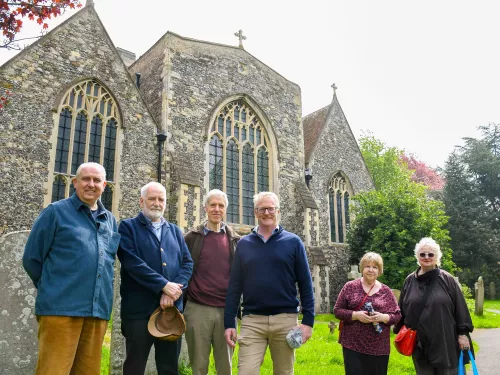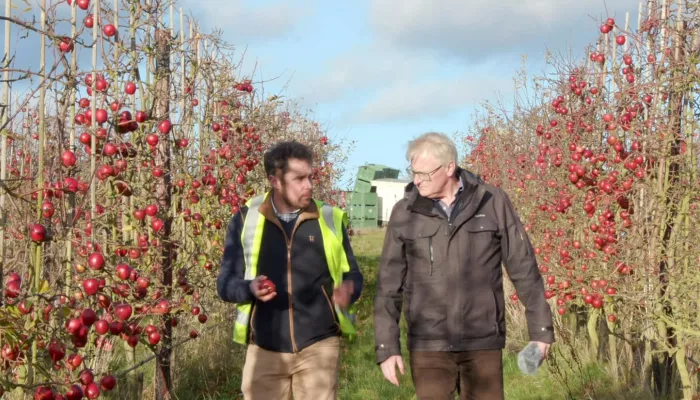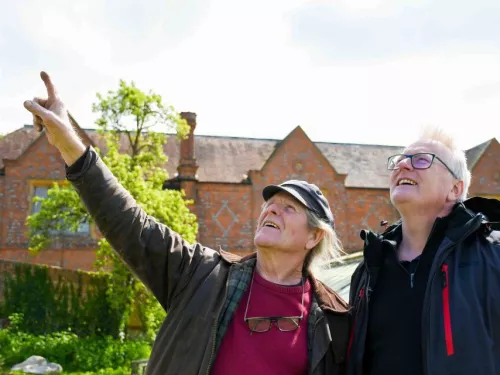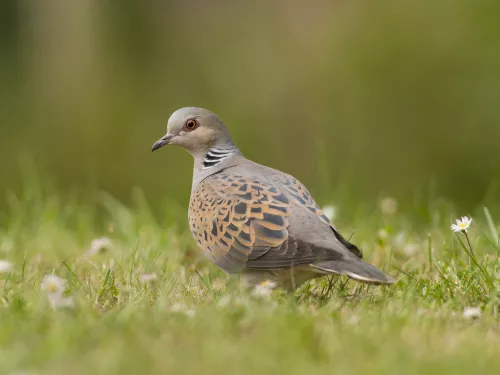Interview Transcript
Rob Smith: Now, 15 years ago, James Smith was determined to be the best top fruit farmer he could be, planting out orchards at 4000 trees to the hectare to produce high quality Braeburn and Gala apples for the supermarkets at Loddington Farm near Maidstone.
But over time, something happened because he became more and more concerned about the amount of fertilisers and pesticides and fungicides and herbicides that he was putting on the land. And the wildlife seemed to be disappearing from the farm. And despite producing fantastic quantities of high quality apples, the process never seemed to actually make him any money. So, a few years ago, he started on a new journey of trying to farm more regeneratively and in more of a nature-friendly way – to let it regain a foothold on his 200 acres and opening a farm shop to sell directly to the public. And he found he got his farming mojo back in the process. Well, James took me for a walk around Loddington and we started in his intensively planted apple orchard.
James Smith: We're growing about just under 4000 trees a hectare on this system and we're using – this is a Braeburn orchard and we've got trees 80 centimetres apart and the rows are 3.25 metres wide. And this is really sort of the blueprint that we ended up with as an intensive apple orchard design, with the aim of being able to produce high quality apples for as lower cost as possible in order to supply supermarkets.
Rob Smith: And as we stand next to a tree here, it's covered in beautiful apples. I'm just going to pick one off here. I mean, this is a Braeburn, isn't it?
James Smith: It is, yeah.
Rob Smith: And it looks great.
James Smith: They taste good, too.
Rob Smith: That really does. It’s a good apple.
James Smith: Yeah. Basically, we had a very strange year this year. You'll see as you look in this orchard, you've got a tree like this one that's fairly loaded behind us, and then you'll have a panel of six or seven, eight, nine trees with nothing. And so, we had a pretty cold spring back in May, which just meant that the flowers didn't develop into fruit, basically.
Rob Smith: But the fact that these trees are covered in fruit at all; it's early December now. This should have all been picked.
James Smith: It should have been, yes, because it was a light crop out here. We also ended up – and we're trying to farm in a way that is moving towards organics, but we ended up with just a little bit of insect damage or a little bit of scab or something in here, which meant that the quality wasn't brilliant. It was a light crop. And then we can't access labour very easily anymore, and the labour we can access is incredibly expensive, so it basically wasn't economical for us to pick this fruit.
Rob Smith: Right, so this is what I really want to kind of get to understand is the fact that you've been on a bit of a journey towards regenerative farming over the last few years. But as a commercial farmer, so 15, 20 years ago, this was state of the art. This is only 15 years old; this orchard, as it's planted up. This was absolutely state of the art if you were going to compete in the commercial world to sell to supermarkets and you just can't make it pay.
James Smith: No, that's right. There's a number of different challenges. I think the weather is a very significant one in terms of we get these blocks of weather, and if you get the wrong weather at a critical time, all things in farming are about doing the right thing at the right time. And like the example I gave about the spring, if you have a block of cold weather, when your trees are flowering, they won't perform particularly well. Equally, if you have a very mild winter, the trees won't perform very well because they need chill units to set a good crop.
So, we've got the challenges around weather patterns, you know climate change, whatever the causes are, and then you have – then the availability of labour. So, if we manage to grow a crop, can we afford the labour to manage it during the year? Can we then get the labour to pick it at the right time? If we've managed that, we can't afford the electricity to run the cold stores, to then store the apples. And at the end of all of that, I know that the supermarket retailers won't pay us a profitable price, so that there is sort of the underlying economics of commercial fruit growing in the UK.
Rob Smith: So, you're having to make some tough commercial decisions about what you do with all of this, and you're finding that actually going down the route of regenerative farming is answering a lot of those questions for you?
James Smith: I think it's part of the process. We've been looking at regenerative farming. I ultimately wasn't happy with the way we were farming commercially or conventionally.
Rob Smith: Emotionally, you mean.
James Smith: Yeah, so I've talked about it before, but it's this sort of dissonance, the gap between what I love about nature and natural systems and how resilient it is and the way we have to farm in order to get a commercially viable crop. So, we used to spray several times with fungicides and insecticides and lots of weed sprays and fertiliser with all of the – and I knew that there's an impact to that. But we would say, well, that's commercial orchard, so that's where we have to produce the crop. Then that bit over there is for nature, and so we would always do as much as we could in terms of making the farmer kind of a good place for wildlife and everything else. But then I started to look at how we could potentially change the way we were farming to try and make the whole farm attractive for nature and wildlife and embetterment of the environment, as well as producing healthy, nutritious food. And that's really the journey that we've been on over the last few years, is trying to work out how we can produce healthy food without harming the environment.
Rob Smith: And how's it going? Is it heading in the right direction?
James Smith: What I've learned is that it's very difficult to retrofit the way I want to farm into an established, intensive system, which, you know, I kind of suspected anyway. But you can do it to a certain extent, but it's very difficult to – this is the sort of the product of years and years of research and as most farming models are, and it's been around the way we farm. So, it's about intensive chemical use and kind of the exclusion of nature and everything else. So, to sort of stop that, start to backtrack and work out how to do it differently, it does have its pitfalls.
And what we find is that these trees, it's almost like we're starting from the wrong place by trying to –you know, we've got to go back further than when we started this journey of intensification.
Rob Smith: Okay, so in five years time then, this orchard won't be here in this format?
James Smith: It will certainly be very near the end of its days in this format. I wouldn't invest in another orchard designed like this because I can't farm them the way I want to farm them. So, for us, we'll have orchards in the future, but they go back to how my great grandfather used to farm and because we want to integrate livestock and everything else. So instead of the business being all about red apples to supermarkets, it's now about a variety of healthy food that we're producing from a sustainable, kind of environmentally sustainable farming model.
Rob Smith: So, James, we're just wandering up from the orchard towards the chickens. And how many have you got? They're just sort of out in the open. You've got a kind of a raised shed in the middle, a coupe.
James Smith: They're fondly known as chicken tractors, but it's basically just a converted trailer that we've made so that they've got somewhere to lay their eggs and somewhere to roost at night. And then during the day, they're out. There's electric fencing to keep them in and keep the foxes out.
Rob Smith: And how many chickens are you actually running at the moment?
James Smith: So, we – originally 200, but I think some of them made the bright decision to fly out and roost outside of the netting, so we lost a few, but I think we're still at about 180 chickens.
Rob Smith: They're all coming over to say hello. Do they think it's dinner time? Is that what it is?
James Smith: Well, they're very sociable creatures, and they do, of course, expect us to give them some top up on their feed ration, but they're out on fresh grass every day. You can see them scratching and foraging or chilling out in the sun. They even seem to like pecking feathers out of each other. But no, again, because they're moving every day onto new ground, they're providing a fertiliser for us.
Rob Smith: Well, I was going to say – so this is part of your regenerative thought process?
James Smith: Absolutely.
Rob Smith: So, what are the chickens actively doing for you, apart from the fact that you end up with chicken and eggs that you can sell in the shop, what are they doing in terms of the ground?
James Smith: So, they're scratching – you're getting the animal effect on the soil, so they're scratching, pecking, they're cleaning up all sorts of insects and eating plants, but fundamentally they're then pooing on the soil. And obviously chicken poo is very nutritious for the soil and so they're actually helping sort of kick start the soil biology.
Rob Smith: And how long do they stay on an individual patch of ground for? Do you have to move them sort of every day or every week or – how often do you do it?
James Smith: Yeah, it's a bit of a labour of love. We move them every day. So, they will have been on this patch today, then they'll be in here tomorrow morning. And so, we move both trailers onto fresh ground every day. And that way they're not scratching around and feeding where they've been pooing the day before. They're always getting nice, healthy stuff. They're living like wild birds. They're foraging and scratching and chasing around. They’ve got the choice to go in the trailer if they want to. They all go in overnight, so they all roost in there at night. We close them up at night and then we collect the eggs once a day.
Rob Smith: And then in terms of sort of the insect life, then that you get in the fields, have you noticed any difference in that? Are you getting more dung beetles and those kind of things flying about the place? Have you spotted any changes with that?
James Smith: I'll be honest, I haven't really kind of surveyed it that closely. The way I look at it is that when, after the amount of rain we've been having, you can walk across this field without getting your boots muddy. And so, there's other measures I haven't been able to do that kind of very close sort of observation of birds and insects and everything else because of time. But what you do as a farmer, you get a feel for the health of your soil just by walking on it. And you can see it here, you know, kind of the greenness of it and everything else. So, this is probably the third time they've been over this field. We had a couple of raised beds over there where we were growing courgettes and turnips and bits and pieces. They've just been over there and raked all that over.
Rob Smith: So, they're doing the work for you?
James Smith: Yeah, exactly. I think we've got a bit of ground with some pigs on it and they're cultivating for us. Pigs are great diggers, so we don't go in there with diesel and steel. We put pigs in, and they do the cultivation for us, so it's just a much softer way of doing things.
Rob Smith: So, you got a few beehives here?
James Smith: Yeah.
Rob Smith: Are they for honey or is this for pollinating the crops?
James Smith: Well, they do both, so we're lucky to have the honey as a bit of a by-product. But we used to bring in hives every April, May for the main blossom period. Now I've got two beekeepers that just keep their hives here all year round, and then we buy the honey off them and sell it through the farm shop.
Rob Smith: So, it's another win win for the business?
James Smith: Yeah, exactly. And again, I think the bees do well here because we work so hard to keep pollen and nectar on the farm for as much of the year as we can. So, the beekeepers like it because the bees do better and we end up with this lovely population of pollinators that help us when things are flowering.
Rob Smith: And as I'm looking across here – so we've got a whole bunch of sort of poles with netting on. So, I think you've got cherry in there?
James Smith: Yeah. So, we got three blocks of cherries, all of which have got rain covers over the top. That's really just to protect them from hail and rain mainly.
Rob Smith: And is that part of the regenerative element? Are you going to carry on with cherry or is that one of these things that was, kind of your previous thought process as an intensive farmer?
James Smith: We're going to carry on with the cherries. The way we plant the cherries has always been more extensive than the apples. We never went down the super intensive cherry production route and I'm glad I didn't. So, we still produce quite a nice crop of cherries if the spring allows us, but we do mostly –
Rob Smith: Noisy, light aircraft going immediately overhead.
James Smith: Always, always. But because we do so much pick your own, that's now our focus is to let customers come and pick their own cherries. And so again, it just means that we're not under quite so much commercial pressure to have really high yields and everything else. But the cherries don't require quite the same kind of intensive management that the apples have. You know, you've just got to look after them and make sure they don't get rained on when they're ready to pick.
Rob Smith: And just the other side there – just the other side of the hives and the cherries, I can see a wind turbine going away there. How long has that been in?
James Smith: So, we put that up ten years ago and it's just a small – it’s eleven kilowatt wind turbine, but on a day like today, we've got 29 kilowatts of solar on the tractor shed roof and we've got that running.
And so, on a day like today, we're generating more than we're using. And it's part of our kind of just strategy to de-risk and try and de-couple from fossil fuels a bit. I love it. When the wind's blowing – I mean, fundamentally, it's earning me money. The wind's blowing and I'm earning money without doing anything, so it’s a –
Rob Smith: That is a win win, isn't it?
James Smith: Yeah, that's right, yeah. At night, when it's windy, the turbine is still working. And on a still sunny day, the solar is working, so it’s just, you know. Again, it's just about diverse income streams, I suppose.
James Smith: So, James, you've come into the farm shop. This is where all the produce ends up.
James Smith: Yeah, absolutely. So, we've got some of our apples here, and we've got our eggs from our chickens that we saw earlier on. We've got some Loddington pork and Loddington venison in the fridge over there. And then we've got a whole range of other things, obviously. All of the Owlett juices are here and then a range of other products. That means that Loddington farm shop's got something for everyone, really.
Rob Smith: So, Owlet, this is your own brand of all sorts of fresh fruit juices, isn't it?
James Smith: Yeah, they're all based around apple or pear juice and blended, either single varieties or blended with other fruits. And yeah, we've had the owlet business for about three years now, so this is where we kind of showcase what we're doing. And actually, our own farm shop is one of our own best customers, so it's good.
Rob Smith: But all the other produce that's actually in here and we're looking along, we've got swedes and potatoes, courgettes, onions; these are all not necessarily from this farm, but from local farms in Kent?
James Smith: Yeah. So, whatever we're not producing from Loddington – I mean, in the summer, we were growing our own courgettes.
We grew some turnips and we're having a bit of a go at everything, because I really feel that whatever we can sell in the shop and I can grow on the farm, I want to grow on the farm, because that's the whole point of the shop, really. If we're not growing it or we don't have any at that time of year, then we go as local as possible. So, if we buy apples, we buy them from a neighbour and if we don't have any of our own at the time, and then it's Kent, then it's UK, and then if it can't be UK, then it's wherever else we can get it from.
Rob Smith: And all those thought processes, is that primarily commercially driven or is that regeneratively driven or sustainably driven? What's the thought process behind doing this this way?
James Smith: I think it's – ultimately, the business has got to make money. And as a shop, I think you need to have a really nice offer. So, it shouldn't be just down to the supermarkets to be able to offer everything to their customers. But what we're trying to do is anything that I can produce on the farm and sell in the shop is the best for the business, so there's a commercial decision, but it's also –
Rob Smith: So that keeps your carbon footprint down. Obviously, you're not putting it on a lorry and pumping out the motorway.
James Smith: I mean, those eggs that are on the counter have travelled about 80 metres from the chicken to the shop counter and then off to the customer's kitchen, so you know, it's about as good as it gets. The apples that we've got here, the Braeburn and the Gala, they have travelled less than a kilometre into our cold store, then into the shop. So, fundamentally, that is what I want to be our kind of point of difference, that, wherever possible, you've got the smallest carbon footprint, the smallest, the lowest food miles, because that's what makes Loddington special.
Rob Smith: And on a kind of personal, emotional level then, how do you feel about how you're farming now in comparison to how you were doing it ten years ago?
James Smith: It's quite challenging because you're trying to unlearn the last 20 years of your career. And I spent most of that time trying to be as good an apple grower as I could. And we're invested and we've ploughed a lot of time and money and effort into being an apple farmer. And I suppose when the penny dropped and then the pennies keep dropping once the first one's gone, my analogy that I trot out all the time is it's like finding a thread on your jumper and you pull the thread and before you know it, there's no jumper left. But I think, emotionally, I believe in what I'm doing. I believe in the changes that I'm making on the farm. I believe, fundamentally, it can work and will work.
But what I'm quite sort of passionate about is actually starting to talk to other growers and farmers, landowners in the area, to work together to try and bring together landscape-scale changes. It's difficult to say whether there's a material difference without doing some deep dives and getting, like, Kent Wildlife Trust or someone to come and look at some baseline surveys and have a look. But I know wherever we have changed what we're doing and we've kind of stopped mowing or we've sort of allowed an area to scrub up a bit, we do see some really interesting stuff; you know, buntings and blackcaps and lots of little things.
I think once you get on the journey of making, sort of dedicating your farm for nature, you look for it more, so you end up sort of celebrating it more and it's part of the journey. What I do know is I'm doing a lot less harm than I was and I think it's always very difficult for farming to quantify the damage it does. We've always been – well, we're producing food, so this is what we've got to do. And I just think you need a degree of humility and accept that actually, we've ended up in a bit of a bad place and it's like, how now do we navigate our way out of it?
Rob Smith: James Smith there. And if you're interested in visiting Loddington Farm and taking a look for yourself, well, it's just south of Maidstone, near Boughton Monchelsea. Their website's got all the details about when the farm shops open and all that kind of stuff, plus loads of great detail about what they're doing regeneratively and why they're doing it. It's Loddingtonfarm.co.uk.




